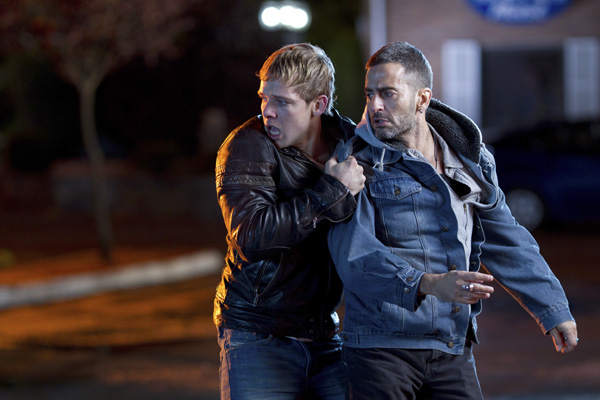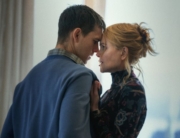For about an hour, Disconnect is an absolute pleasure to watch. It delves into the texture of contemporary life with grace and panache, investing a remarkable amount of drama into the oh-so-familiar image of someone looking at a computer screen. It’s a testament to the technique of the director (Henry-Alex Rubin) and writer (Andrew Stern) as well as to our own immersion in electronic communication that it’s so easy and involving to follow.
A splintered narrative guides us through this strange, multifaceted, and intimately recognizable world. Its familiar structure is also a clever statement on the fractured nature of modern life. Each thread is further split by iPads, phones, and computers, and the result is an act of keen observation that feels like an end in itself. Disconnect is at its most immersive when the many narratives are nothing more than clues to lives richly lived and experienced.
We watch as a television reporter (Andrea Riseborough) stumbles across a live webcam sex site, meeting an underage performer (Max Thieriot) in an unsettling technological variant on the meet-cute. As she builds a TV story about his experiences with and without his help, their relationship begins to skirt the boundaries of the appropriate with convincing naturalism. Thierot is a vision of youth and impulse, while Riseborough hits her mark with unerring precision.
Elsewhere an affluent suburban family receives a shock when their shy son is the victim of online bullying by a pair of classmates, a development that is no less effective for being completely foreseeable. Jonah Bobo does nice, understated work as the troubled son, while Colin Ford, as one of his tormentors, is remarkably poised for such a young actor. Touching and unnerving as the family’s patriarch, Jason Bateman finds the dark sides of his usual everyman shtick, and Haley Ramm also deserves note as the teenage daughter who rises to the occasion.
In the third narrative strand, a couple (Paula Patton and Alexander Skarsgard) have dealt separately with a personal tragedy by turning to their computers for solace. But when their identity is stolen, the tenuousness of their stability is quickly exposed. Patton is sad and lovely, while Skarsgard is blonde, statuesque, and then all of the sudden quite moving.
It’s easy to invest in each richly depicted and believable story, but it turns out that for all its sophistication, Disconnect has traditional moralizing on the mind: sins, fathers, sons, that sort of thing. Those topics are certainly worthwhile in their own way, and as everyone hurtles slowly toward their fate, and Max Richter’s score tears your heartstrings to shred, it’s difficult not to be moved.
But for a film with such a delicious sense of the modern world, of its colors and surfaces and keyboards, it’s almost disappointing to find it returning to something as traditional as the big finish. As the story lines tighten and intertwine, the filmmakers’ aims are clarified and their impact lessened. No good deed goes unpunished and no lesson unspoken. Films like Babel and Crash have paved this territory so thoroughly that the climactic collision feels less like a revelation than a structural tic.
Despite ultimately veering too close to the maudlin, Disconnect is a thick, viscous film that deserves a surfeit of adjectives. It’s at once exhilarating and upsetting, moving and disappointing, exuberant and frustrating. And though in the end it reveals itself to be a moralistic fable of the modern world, I still relish those initial moments when it was a pure and confusing burst of life instead.







Leave A Comment